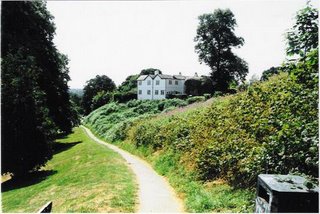 Over the past twelve months the Rev David Enticott, from the Mordialloc Baptist Church in Victoria, has been spending some time researching F.W. Boreham’s sermons. His specific task was to examine the influences prevalent in Boreham’s earliest sermons from 1891 to 1895. These messages were delivered at a variety of churches through the United Kingdom, in areas such as: Clapham (in London), Theydon Bois (on the outskirts of London and Boreham’s first placement as a pastor) and Tunbridge Wells (his childhood home.)
Over the past twelve months the Rev David Enticott, from the Mordialloc Baptist Church in Victoria, has been spending some time researching F.W. Boreham’s sermons. His specific task was to examine the influences prevalent in Boreham’s earliest sermons from 1891 to 1895. These messages were delivered at a variety of churches through the United Kingdom, in areas such as: Clapham (in London), Theydon Bois (on the outskirts of London and Boreham’s first placement as a pastor) and Tunbridge Wells (his childhood home.) A number of these original sermon manuscripts are contained in the archives of the Baptist Union of Victoria. David is now undertaking a master’s thesis, with a view to examining both the influences and changes evident in Boreham’s preaching throughout his ministry career.
The following articles are excerpts from David’s Masters Qualifying essay, which I have had the privilege of supervising.
I have (with David’s permission) carved his offering into three postings. Thank you David for this contribution:
Frank William Boreham was born to Francis and Fanny Boreham on the 3rd of March 1871. He was raised in the village of Tunbridge Wells, Kent, which is located an hour’s train ride south of London. Today Tunbridge Wells remains a picturesque village, surrounded by lush English countryside. A large common, or public garden, still dominates the western side of the town, as it did in F.W. Boreham’s time.
The captivating beauty of F.W. Boreham’s surroundings in the Kent of his childhood was to have an influence upon his preaching. He encountered nature in a variety of ways. The experience of walking to church had just as profound an effect on him as did each service itself. It was a place to encounter God. His father Francis was a keen walker, and on many occasions he would find a new way to walk to the Sunday worship service. Each moment in nature was an experience to be savoured for the young F.W. Boreham.[1] It was sacramental, a place resonant with God and grandeur. The family also went out for walks on Saturdays. Francis[2] would season these hikes by means of using his “racy conversation about nature.”[3] The key was to observe one’s surroundings. F.W. Boreham was taught to cherish the natural world.
Later, when Boreham returned to Tunbridge Wells on a trip from New Zealand, he described its surrounds as follows:
“Its sylvan valleys, bespangled with primroses and bluebells and violets,
its fragrant hedgerows aglow with the hawthorn and the honeysuckle; its
exquisite parks carpeted with an infinite variety of ferns and flowers; its
verdant and undulating common…its magnificent forests; its romantic walks; its
arching avenues; its giant rocks and dainty mosses…”[4]
These are the notes of someone who as a child was an observer, who paid attention to his environment. However, although nature was an influence on his preaching, it did take time to develop.
(To be continued)
[1] He wrote that: “We always set out.. in a perfect fever of curiosity and every step of the way was made brimful of interest.” In: F.W.Boreham, The Other Side of the Hill (London: The Epworth Press, 1917), 113.
[2] His Father worked in a local legal firm and the family grew up in relative comfort. Their home at 134 Upper Grosvener Road had eight rooms and two stories. Crago, The Story of F.W.Boreham, op.cit., 19.
[3] ibid., 21.
[4] FW Boreham, Loose Leaves: From The Journal of my Voyage Round the World (Mosgiel: “Taieri Advocate” Office, 1902), 44.
David Enticott
Image: Tunbridge Wells Common. Photo taken by David Enticott.


